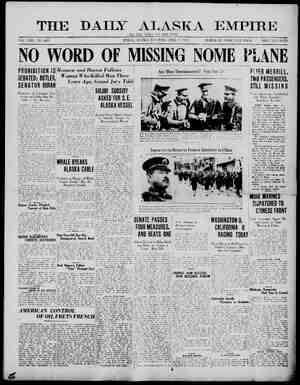The Daily Worker Newspaper, April 9, 1927, Page 5
You have reached the hourly page view limit. Unlock higher limit to our entire archive!
Subscribers enjoy higher page view limit, downloads, and exclusive features.
Tue New MacazZINE Section of THE DAILY. WORKER Second Section: This Magazine Section Appears Every Saturday in The DAILY WORKER. OE A SBE IIR TT OL EET A ESI TET ERIN tc OS 8 NE ENR. SATURDAY, APRIL 9, 1927. WHEN A FARMER BEGS FOR RELIEF RELIEF ~~ FOR MANUFACTURERS, 7 WALL STREET, ~/ Jil STEEL TRUST, Jf 74> BIG BIZ. a \S ETC! oF Southern employers of labor are deeply alarmed over the prospect of mass migration of Negro la- bor from the south. And well they might be. The restlessness and dissatisfaction of the Negro masses in the “southern heaven of happinéss” is continu- ally increasing. Whether the east, north or west really offer the Negro masses better conditions of life, the Negroes seem to feel that by leaving the south they stand to lose nothing. In other words, nothing can be worse than what the Negro worker and farmer are getting in the south. 3 The impending movement of thousands of Ne- groes from the south to Chicago has moved the capitalists and their newspapers in Arkansas, Ten- nessee, Louisiana and Alabama to frantic measures to prevent what they term “a shortage of labor on the farms and in the factories of those states.” An appeal issued by the city commissioners of Mobile, Alabama, through Mayor Hartwell, says in part: Many Alabama Negroes are leaving the south, going to Chicago, with a promise of so- cial favor and rich employment Believing that there is a better understanding between the Negro and the white man of the south than In any other section, we request that the Negroes seriously consider a movement of this character before taking action, especially in view of the fact that unemployment is so widespread in the city of Chicago. Statistics recently published estimate that there are more than 25,000 Ne- groes out of work in that citw. ALEX BITTELMAN, Editor eae In their anxiety to keep the Negroes from leaving the south, the capitalists of that section are even ready to “blacken” the good name of Chicago by presenting Negro life there almost in its true light. Which, however, does not in the least detract from the hypocrisy of their appeal to the Negroes. Just imagine: the understanding between the Negro and the white man (read: capitalists—A. B.) in the south is better than in any other section! Is there anything more brazenly hypocritical than this? * * * To counteract the urge of the Negroes to migrate, the Mobile chamber of commerce pictures in glow- ing terms the grand possibilities for prosperity in the south. It says in its bulletin: Mobile has just reached the point in its In- dustrial development where it can ill afford to lose any of its: workmen. With the completion of our $10,000,000 dock system new industrial enterprises have sprung up here which utilize Negro labor extensively. Any considerable mi- gration of Alabama Negroes to Chicago such as already has begun, would hamper Mobile and the entire south. The chamber of commerce * urgently requests all employers and others who have the interests of Mobile and the Negro at heart to check the spread of the rumor that big- paying jobs are awaiting the southern Negro in Chicago. . No doubt the opportunities for profit by exploit- ing southern labor in industrial enterprises are vreat, We snoke of thie in the last. issue of the (ivr, .NO ries WELL, THAT SHOWS { f You PARE STILLY LL“ UOST GO AND 2 2 GET A LITTLE _OF THIS TRELIEF 7 OAVSELF:! ae, ssehapianitanilienpesemeiti / vse Wf Veta reco ‘ “ Meir, ~~, Phen ees | Ane SATE RGD, d 4 | IDIDAT? \r* EXPECT SUCH) |/ TREATMENTA ws PResiDENT,!” BRO | ing By ALEX BITTELMAN New Magazine discussing the tremendous indus- trialization of the south. But what does labor stand to gain by it? What do the Negroes stand to gain by it? The fear of losing Negro labor is not confined to the capitalists of the southern cities alone, but is affecting seriously the slave drivers of the south- ern plantations as well. So much so that the com- missioner of agriculture of Arkansas, M. W. Wilkes, feels compelled to déliver himself of thé following: “Negroes in Arkansas are being told tales of rich jobs and high social favors that await them in Chicago. We do not want to find oureslves in the position of being shorthanded on our farms and plantations. Planters should use proper influence to counteract such political propaganda as is being foisted upon the Negro of the south. We do not know the source from which this “political” propaganda is emanating. But we will not be surprised to hear that the Communists have something to do with it. Not because there would be any ground for a charge of this kind, but on the general principle, so cleverly enunciated by the Bri- tish government, that wherever the capitalists are in trouble,—look for the Communists. . This a very convenient kind of a principle. Just recently our secretary of state, Kellogg, tried to make use of it in the Nicaragua and Mexican situ- ations, but burned his fingers on it. Presumably, because of lack of skill. We are quite hopeful, (Continued on Page Five)




